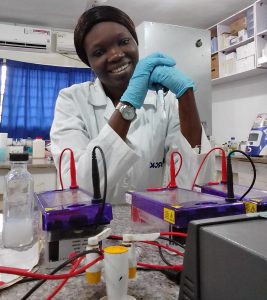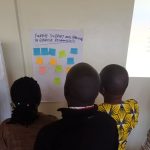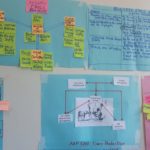
Reflections on a busy year
As 2019 draws to a close, John Young and INASP staff reflect on the year that has been and look to the year ahead.
This time last year I was reflecting on my first month at INASP and looking forward to getting to know the INASP team and our work better. And I have really enjoyed my scenic commute via a recently frosty Parsons Pleasure and learning about all the exciting work we have been involved in. So for my end of the year post, I thought I would ask INASP staff to share some of their own highlights.
- Gender-responsive pedagogy and the multiplier effect
The Transforming Employability for Social Change in East Africa (TESCEA) partnership is one of our biggest pieces of work. TESCEA is working with four universities in Uganda and Tanzania, as well as Kenyan partners, to help graduates become better equipped with the critical thinking and problem-solving skills they will need to fulfil their potential in employment and wider society. This work is designed to be scalable and sustainable, and to be gender responsive, so there is an important role for so-called multipliers in taking this work forward.
Tabitha Buchner, one of the TESCEA team, made a video about multipliers and their role in ensuring gender responsiveness and scalability.
- Gender and journal publishing
Gender issues were also a highlight for Sioux Cumming who leads on INASP’s work with journal editors and journal platforms in Asia, Africa and Central America:
“I was inspired by the book ‘Invisible Women’ and by the reaction of the editors in Uganda and Ethiopia to the workshop session devoted to gender issues in journal publishing and research reporting.”
Over the past year we held workshops with journal editors in Kampala and Addis Ababa, as well as an online course for journal editors, to help them reflect on their publishing processes and work towards improved Journal Publishing Practices and Standards (JPPS) badges.
- Supporting evidence use in decision making
For Emily Hayter, Senior Programme Specialist, a highlight of the past year was the opportunity to participate in a writing retreat hosted by CLEAR-AA in Nairobi and to work with like-minded organizations from across Africa on a new book on evidence systems in African parliaments.
In this book, Emily will be co-authoring, with Issifu Lampo of the African Centre for Parliamentary Affairs (ACEPA), a chapter based on the new Data for Accountability (DAP) project. This project, which is led by ACEPA and also includes the Ghana Statistical Service, is helping the Parliament of Ghana to improve the national quality of life through evidence, using data to oversee progress towards the Sustainable Development Goals.
We are also excited to be part of a new five-year, DFID-funded programme, Strengthening the Use of Evidence for Development Impact (SEDI). This programme will work to increase the use of evidence by policymakers in Uganda, Ghana and Pakistan, which will contribute to more efficient and effective decision-making by partner governments. We will share more about this work over the coming year.
- Empowering early-career researchers

This year’s winner of the AuthorAID Capture your Research competition is Olajumoke Olufemi, a pharmaceutical microbiologist who is passionate about curbing antibiotic resistance.
In our AuthorAID work, a highlight was our most recent online course in research writing, which saw our highest level of completion – 51%. It was also the first time that we had more female (1,628) than male (1,625) participants on a course.
As one participant commented in the final feedback:
“I really gained a vast amount of knowledge from this course. This is the first online course that I have ever done. I wish I had done this course some 20+ years ago when I first became an academic staff. I will suggest that my younger research students and colleagues enroll for this course. I feel now that I will be a better candidate for writing research papers in the science. I give this course an A+ grade.”
Another notable feature was that it was the first time we had co-sponsors for an online course –the Royal Society of Chemistry PACN network, OWSD and EASTECO/UNCST. Co-sponsorship enabled researchers within the networks of these organizations to access some additional training activities.
AuthorAID also successfully piloted journal clubs in a range of broad subject areas and testing different platforms. We are looking to roll these out more widely in 2020.
- Informing Open Access discussions
In November we published a journal article about Open Access awareness and experiences from across the AuthorAID network. As Siân Harris, Communications Specialist, explains:
“It became clear to us that evidence about researchers’ experiences of Open Access tends to be dominated by perspectives from the Global North and so the high level of engagement with this paper and its findings has been encouraging.”
- Equitable knowledge ecosystems
In our 2018-19 Annual review we highlighted some new thinking on how greater equity in research and knowledge systems, what we call equitable knowledge ecosystems, are essential if research and knowledge are to be at the heart of development in the long term. Since then we have discussed this idea with a wide range of partners and like-minded organizations at various events including the Development Studies Association conference at the Open University in June and the Global Development Network Conference in Bonn in October. A key role for organizations like INASP is capacity development, but, as Jon Harle explains in How do you do capacity development well, it is neither easy nor cheap.
“It needs expertise, and that means it requires time. On the other hand, bad capacity development is expensive – scarce resources are wasted, including time of the participants, and at its worst it can undermine capacity and confidence and have a limited lasting impact.”
- New approaches and strategy
In addition to work to learn about and support research and knowledge systems around the world we have also been looking at some of our internal ways of working. Veronika Schaeffler, who is a Programme Specialist, highlighted our newly formed ‘Technology enhanced learning & Capacity Building’ hub. This will act as a strategic lead for INASP’s learning and capacity development work. It will include both where digital technologies are used to enhance other capacity building approaches and where learning is predominately through a digital platform. The hub will advise on business development opportunities, support staff learning, strengthen accessibility and promote inclusion. It will also support reflection on online alternatives to face-to-face meetings involving travel that may have an impact on climate change.
We have also been thinking about how INASP needs to change in order to be able to continue to contribute to ensuring “research and knowledge at the heart of development”. We need to continue our transition from a classical hub and spoke network based in the UK delivering capacity development services to and through partners in the South towards a peer-to-peer network, or innovation ecosystem. And, as an organization, we need to be more flexible and democratic and able to constantly evolve to deliver our purpose – what Frederic Laloux in his book Reinventing Organizations calls “Evolutionary Teal”.
It has been a great year, and I look forward to more exciting work with our global partners next year and beyond. But there are clouds on the horizon. Brexit will redefine the UK’s relationship with the whole of the rest of the world, and the new UK government’s possible merger of the UK Department for International Development with the Foreign and Commonwealth Office threatens to undermine the whole UK contribution to international development. We will have to work together even more closely if we are to avoid the experience of other countries that have gone down this path.

 Previous Post
Previous Post Next Post
Next Post


